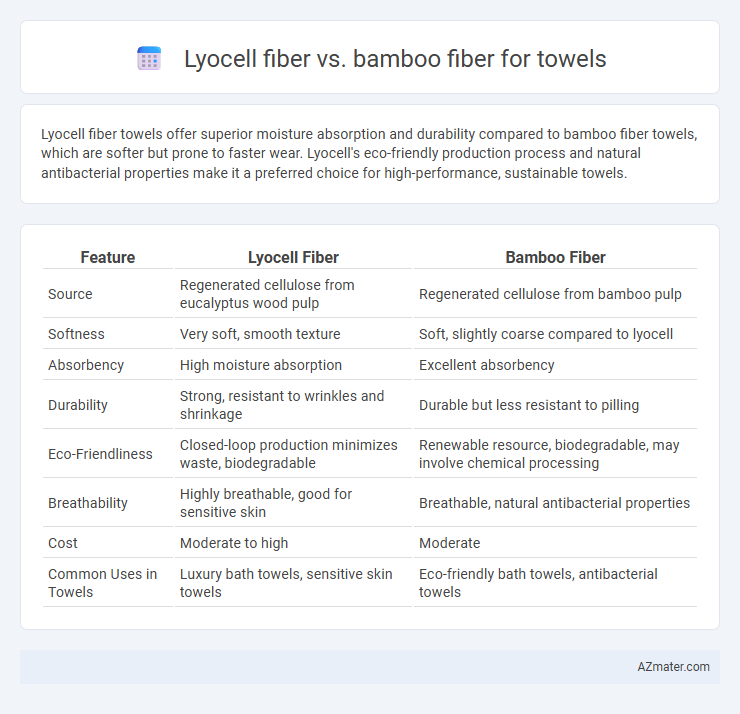Lyocell fiber towels offer superior moisture absorption and durability compared to bamboo fiber towels, which are softer but prone to faster wear. Lyocell's eco-friendly production process and natural antibacterial properties make it a preferred choice for high-performance, sustainable towels.
Table of Comparison
| Feature | Lyocell Fiber | Bamboo Fiber |
|---|---|---|
| Source | Regenerated cellulose from eucalyptus wood pulp | Regenerated cellulose from bamboo pulp |
| Softness | Very soft, smooth texture | Soft, slightly coarse compared to lyocell |
| Absorbency | High moisture absorption | Excellent absorbency |
| Durability | Strong, resistant to wrinkles and shrinkage | Durable but less resistant to pilling |
| Eco-Friendliness | Closed-loop production minimizes waste, biodegradable | Renewable resource, biodegradable, may involve chemical processing |
| Breathability | Highly breathable, good for sensitive skin | Breathable, natural antibacterial properties |
| Cost | Moderate to high | Moderate |
| Common Uses in Towels | Luxury bath towels, sensitive skin towels | Eco-friendly bath towels, antibacterial towels |
Introduction to Lyocell and Bamboo Fibers
Lyocell fiber, derived from sustainably sourced wood pulp, is renowned for its exceptional softness, moisture-wicking properties, and biodegradability, making it ideal for high-quality towels. Bamboo fiber, extracted from bamboo plants through mechanical or chemical processes, offers natural antimicrobial benefits, excellent absorbency, and durability, enhancing towel freshness and longevity. Both fibers are eco-friendly alternatives to traditional cotton, catering to the growing demand for sustainable textile options in bath linens.
Fiber Source and Production Process
Lyocell fiber is derived from sustainably harvested eucalyptus wood through an eco-friendly, closed-loop solvent spinning process that recycles almost all chemicals and water, minimizing environmental impact. Bamboo fiber for towels is typically produced by chemically breaking down bamboo pulp into viscose rayon, a process that involves toxic chemicals and higher environmental concerns due to limited recycling of solvents. The sustainable production of Lyocell makes it a preferred choice over bamboo fiber for eco-conscious towel manufacturing.
Environmental Impact Comparison
Lyocell fiber, derived from sustainably managed eucalyptus forests using a closed-loop solvent process, offers a significantly lower environmental footprint than bamboo fiber, which often involves chemical-intensive extraction methods like viscose production. Lyocell's production consumes less water and energy, emits fewer greenhouse gases, and generates minimal waste compared to bamboo fabric manufacturing that can contribute to deforestation and toxic effluent release. Towels made from Lyocell exhibit enhanced biodegradability and reduced ecological impact, positioning them as a more sustainable choice for eco-conscious consumers.
Absorbency and Drying Speed
Lyocell fiber exhibits superior absorbency compared to bamboo fiber, absorbing moisture quickly and efficiently, making it ideal for towels that need to manage sweat and water effectively. Bamboo fiber, while also absorbent, tends to retain moisture longer, which can slow down drying speed and lead to a damp feel after use. Towels made from Lyocell dry significantly faster due to its advanced moisture-wicking properties, enhancing comfort and reducing the risk of mildew growth.
Softness and Comfort
Lyocell fiber offers superior softness and moisture-wicking properties, making towels exceptionally comfortable and gentle on sensitive skin. Bamboo fiber is naturally antibacterial and highly absorbent, providing a smooth texture that enhances comfort during use. Both fibers excel in breathability, but Lyocell's smooth surface delivers a silkier touch compared to bamboo's slightly coarser feel.
Durability and Longevity
Lyocell fiber offers superior durability and longevity in towels due to its strong cellulose structure and resistance to pilling and abrasion, maintaining softness even after multiple washes. Bamboo fiber, while naturally antimicrobial and eco-friendly, tends to be less durable and may break down faster with frequent laundering. Towels made from Lyocell typically retain their shape and absorbency longer compared to bamboo fiber alternatives.
Antibacterial and Hypoallergenic Properties
Lyocell fiber demonstrates superior antibacterial properties compared to bamboo fiber due to its moisture management capabilities that inhibit bacterial growth on towels. Both fibers are hypoallergenic, but Lyocell's smoother fiber surface reduces irritation and allergen retention more effectively than bamboo. Towels made from Lyocell are preferred for sensitive skin and hygienic purposes in comparison to bamboo counterparts.
Cost and Affordability
Lyocell fiber towels generally have higher manufacturing costs due to their environmentally friendly closed-loop production process, which can result in a higher retail price compared to bamboo fiber towels. Bamboo fiber towels tend to be more affordable, benefiting from faster raw material growth and less intensive processing. Consumers seeking budget-friendly options often find bamboo fiber towels offer better cost-effectiveness without significant compromise on softness or absorbency.
Sustainability and Eco-Friendliness
Lyocell fiber, derived from sustainably managed eucalyptus forests using a closed-loop production process, offers superior eco-friendliness compared to bamboo fiber, which often involves chemically intensive extraction methods despite bamboo's rapid growth. Lyocell's biodegradable and non-toxic nature minimizes environmental impact, making towels crafted from it highly sustainable. Bamboo towels, although naturally antibacterial and biodegradable, may carry a larger carbon footprint due to processing chemicals and water usage.
Conclusion: Best Choice for Towels
Lyocell fiber offers superior moisture-wicking properties and a softer texture, making it an excellent choice for towels that require quick drying and a gentle touch on the skin. Bamboo fiber provides natural antimicrobial benefits and eco-friendly characteristics but tends to have a slower drying time and less durability compared to lyocell. For high-performance, sustainable towels that combine softness, absorbency, and longevity, lyocell fiber is the best choice.

Infographic: Lyocell fiber vs Bamboo fiber for Towel
 azmater.com
azmater.com